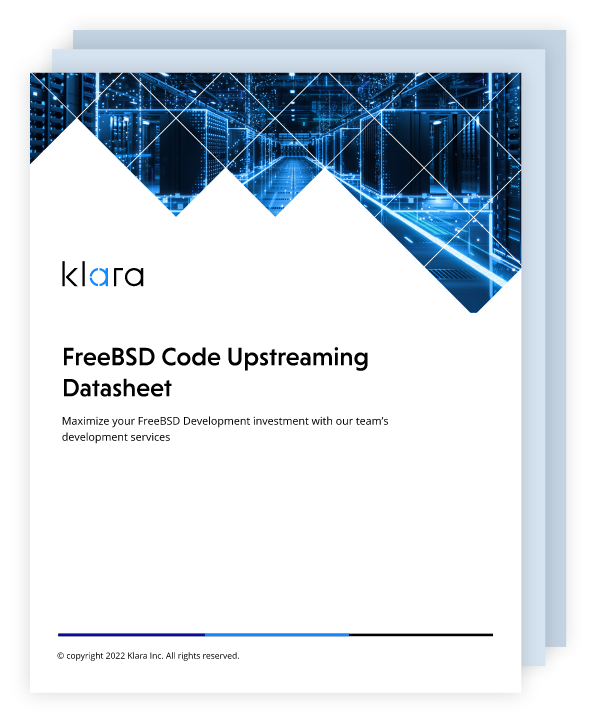Looking to learn more?
Our teams are ready to provide you with the details you need to make the next step.
Contact UsGetting Started
Don’t miss the opportunity to leverage our specialized FreeBSD development expertise for your project or hardware. Partner with us today to unlock seamless integration, performance optimization, and a streamlined path to success in the FreeBSD ecosystem.
Maximize your FreeBSD Development investment with our team’s development services
Klara’s commitment to excellence extends to upstreaming code contributions to the FreeBSD community, fostering collaboration and continuous improvement. Through this process, your FreeBSD projects become an integral part of the official FreeBSD ecosystem, benefiting from community feedback, testing, and ongoing maintenance and support. Experience seamless integration, optimized performance, and a streamlined development journey with Klara’s FreeBSD development services.
Partnering with Klara for FreeBSD development services, including kernel development, driver development, custom feature development, and upstreaming, unlocks unparalleled expertise and experience in the domain. Klara’s specialized team of developers possesses in-depth knowledge of FreeBSD’s intricacies, enabling the creation of robust, high-performance solutions tailored to your specific requirements. By tapping into Klara’s proficiency, you gain a competitive advantage with accelerated time-to-market, ensuring your projects are completed efficiently and delivered to your audience promptly.
Our Comprehensive FreeBSD Development Process
Developing for FreeBSD, the robust and open-source operating system, requires a structured and meticulous approach. A well-executed FreeBSD development project ensures seamless integration, optimal performance, and stability within the operating system.
The development process typically includes the following steps:
- Requirement Gathering: The project starts with gathering requirements from the users and/or the client. This involves understanding the project specifications, the target operating system version(s), the desired functionalities, and any specific performance goals.
- Design and Planning: Based on the gathered requirements, the FreeBSD development team creates a design plan outlining the system’s architecture, interfaces with the operating system, and hardware interactions. This stage includes defining the project’s data structures, APIs, and overall project scope.
- Coding, Implementation, Testing and Debugging: The actual coding phase involves writing the kernel code according to the design specifications. Low-level programming languages like C or assembly are most commonly used for kernel development. The newly developed code then undergoes rigorous testing to ensure it performs as expected under different conditions and hardware configurations. Debugging tools and techniques are utilized to identify and fix any issues encountered during testing.
- Optimization: After initial testing, the FreeBSD kernel patches are optimized to enhance its performance, efficiency, and stability. This may involve fine-tuning algorithms, reducing resource usage, and improving response times.
- Documentation: Detailed documentation is created to help users and developers understand how to integrate the new feature(s) into their systems. This documentation may include installation instructions, API references, and troubleshooting guides.
- Integration and Review: The patch is then integrated into the target operating system environment. Before proceeding further, the code is reviewed by the development team and possibly other contributors to ensure adherence to coding standards and best practices.
- Validation and Certification: If the patch is intended for use in regulated industries or safety-critical systems, it undergoes validation and certification processes to comply with relevant standards and regulations.
- Release and Maintenance: Once the patch passes all tests and certifications, it is released to the end-users or the client. Ongoing maintenance is provided to address bugs, add new features, and ensure compatibility with future operating system updates.
- Community Contribution (Upstreaming): In some cases, the project may contribute the new code to the open-source community. Upstreaming the FreeBSD changes allows for collaboration, code review, and continuous improvement by a broader community of developers.
Throughout the entire project, communication and coordination between the Klara development team and the end-users and/or client is critical to ensure that the project meets the intended requirements and delivers a reliable and high-performing solution.
The Klara Inc. team of engineers have the deep expertise in the FreeBSD OS required to quickly investigate and rectify the most stubborn issues. When organizations face technical challenges, they need a partner with experience and the industry and community connection






